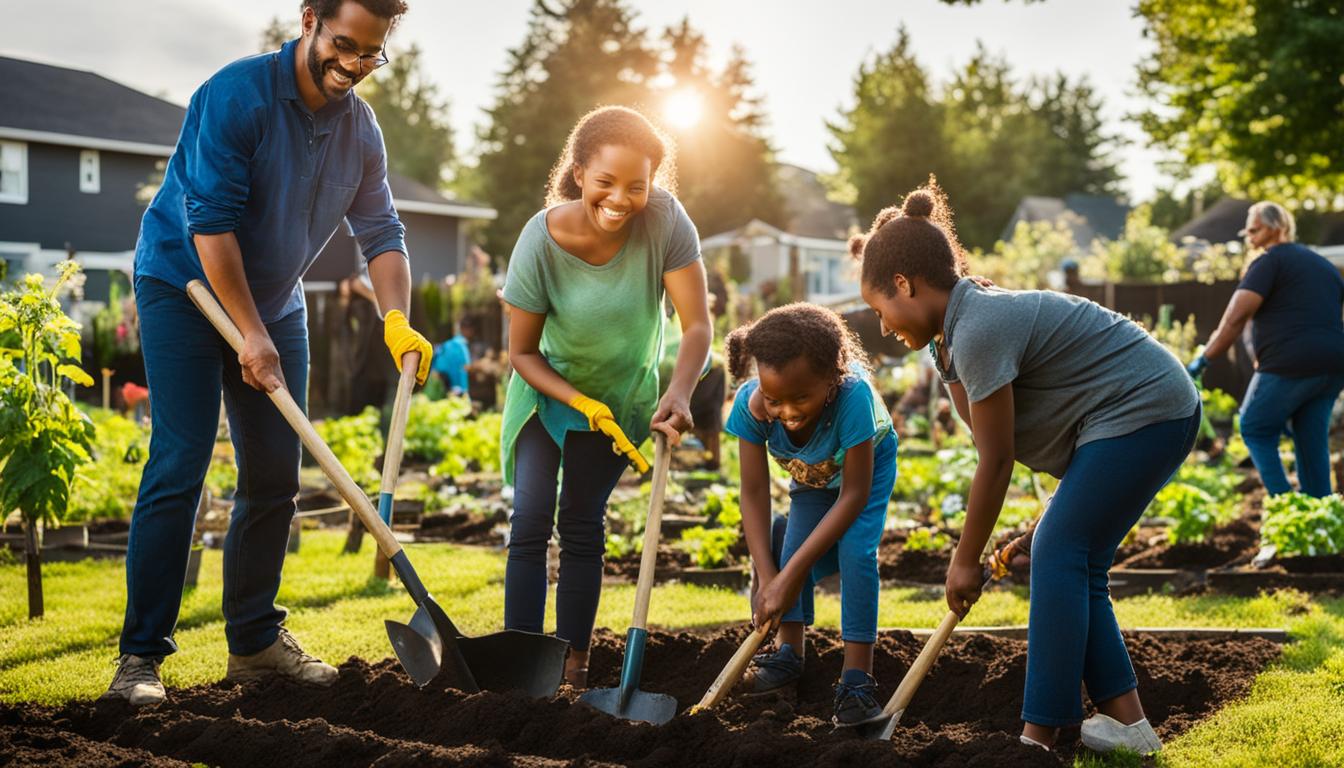
Give Back: Family Volunteer Projects That Make a Difference
Family volunteer projects are a wonderful way to make a positive impact on both your community and your family’s bonds. By engaging in volunteer work together, you can instill important values in your children, teach them about empathy and compassion, and create lasting memories. Research shows that participating in volunteer projects as a family can improve communication and teamwork skills, increase gratitude and happiness, and strengthen family relationships.
There are various types of family volunteer projects available across the US that cater to different interests and causes. Whether you’re passionate about environmental conservation, community service, animal welfare, or supporting those in need, there are volunteer opportunities for every family. Volunteering as a family not only benefits your community but also fosters a sense of togetherness and shared purpose within your own household.
Key Takeaways:
- Family volunteer projects help strengthen bonds and instill important values in children.
- Participating in volunteer work together improves communication, teamwork, and gratitude.
- There are various types of family volunteer projects available across the US.
- Volunteering as a family benefits both your community and your own family.
- Research shows that family volunteer projects increase happiness and strengthen family relationships.
Benefits of Family Volunteer Projects
Engaging in family volunteer projects offers numerous benefits for both families and communities. By participating in volunteer work together, families can make a positive impact in their communities by supporting non-profit organizations, helping those in need, and contributing to a greater cause.
These projects provide an opportunity for families to bond, communicate, and work together towards a common goal. Volunteering also allows children to develop empathy, compassion, and social responsibility. Additionally, engaging in volunteer work as a family can improve mental and emotional well-being, increase happiness and gratitude, and create lasting memories.
“Volunteering is the ultimate exercise in democracy. You vote in elections once a year, but when you volunteer, you vote every day about the kind of community you want to live in.”
Positive Impact on Communities
Family volunteer projects make a significant positive impact on communities by addressing various needs and issues. By dedicating their time and effort, families can support non-profit organizations that work tirelessly to improve the lives of others. Whether it’s organizing a food drive, participating in a community clean-up, or volunteering at a local shelter, families contribute to the betterment of their community and help create a more inclusive and compassionate society.
Fosters Family Bonding and Communication
Participating in volunteer work as a family creates an environment for bonding and open communication. Working together towards a common goal strengthens family relationships as members collaborate, problem-solve, and support one another. It provides an opportunity for shared experiences, fosters trust and mutual respect, and enhances family connections.
Develops Life Skills in Children
Engaging in family volunteer projects allows children to develop essential life skills that will benefit them throughout their lives. By actively participating in volunteer work, children learn empathy and compassion as they witness the struggles faced by others. They also develop a sense of social responsibility and an understanding of the importance of giving back to the community. These experiences help shape their character, cultivate a sense of gratitude, and encourage a lifelong commitment to making a positive difference.

In conclusion, family volunteer projects offer a multitude of benefits, both for the families themselves and the communities they serve. By engaging in volunteer work, families can make a positive impact, foster stronger bonds, and empower their children with valuable life skills. The rewards of community involvement and giving back are immeasurable, creating a ripple effect that extends far beyond immediate actions.
Types of Family Volunteer Projects
When it comes to family volunteer projects, there is a wide range of options available across the US. These projects cater to different interests and causes, allowing families to find the perfect opportunity that aligns with their passions and values. Below are some common types of family volunteer projects that families can consider:
- Environmental Conservation: Participate in activities such as beach cleanups, tree plantings, or wildlife conservation projects to protect and preserve the environment.
- Community Service: Get involved in community-driven initiatives, such as neighborhood cleanups, park beautification, or mentoring programs, to make a positive impact in your local community.
- Animal Welfare: Volunteer at animal shelters, wildlife rehabilitation centers, or conservation organizations to help care for and protect animals in need.
- Food Drives: Contribute to food drives or volunteer at food banks to help combat food insecurity and ensure that everyone has access to nutritious meals.
- Homeless Shelters: Assist at homeless shelters by serving meals, providing hygiene kits, or organizing clothing drives to support individuals experiencing homelessness.
- Elder Care: Engage in activities at nursing homes or assisted living facilities, such as spending time with seniors, playing games, or organizing social events.
- Literacy Programs: Support literacy initiatives by volunteering at libraries, after-school programs, or tutoring centers to help children and adults develop essential reading and writing skills.
- Disaster Relief: Mobilize during times of natural disasters or emergencies by assisting with relief efforts, including providing shelter, distributing supplies, or helping with cleanup and rebuilding.
These are just a few examples of the types of family volunteer projects available. Families can choose projects based on their interests, skills, and availability. It’s important to research and reach out to local organizations that offer volunteer opportunities for families. Many organizations have specific programs designed to engage children of all ages, ensuring that everyone can contribute in meaningful ways.
Remember, some projects may require a time commitment, while others offer one-time events or ongoing opportunities. So, whether you’re looking for a short-term experience or a long-term commitment, there are volunteer opportunities available that can fit your family’s schedule and preferences.

Quote:
“Volunteering is the ultimate exercise in democracy. You vote in elections once a year, but when you volunteer, you vote every day about the kind of community you want to live in.” – Unknown
Benefits of Family Volunteer Projects:
| Benefits for Families | Benefits for Communities |
|---|---|
| Strengthens family bonds and relationships | Supports non-profit organizations |
| Improves communication and teamwork skills | Assists those in need |
| Teaches empathy and compassion | Creates a positive impact |
| Fosters gratitude and happiness | Strengthens community involvement |
| Creates lasting memories | Promotes social responsibility |
How to Get Involved in Family Volunteer Projects
Getting involved in family volunteer projects is a meaningful way to make a difference and strengthen your family bonds. If you’re looking to give back as a family, there are several steps you can take to get involved and contribute to your community.
Start by researching local non-profit organizations, community centers, and religious institutions in your area. These organizations often have volunteer opportunities that align with your interests and values. Many of them have websites or volunteer coordinators who can provide information on upcoming projects and how to get involved.
In addition, consider reaching out to friends, neighbors, or your children’s schools to organize your own volunteer projects. This can be a great way to tailor the experience to your family’s specific interests and availability. By planning ahead and scheduling regular volunteer activities, you can make volunteering a regular part of your family’s routine.
When getting involved in family volunteer projects, it’s important to discuss expectations and goals as a family. This ensures that everyone is on the same page and understands the impact you hope to make. By giving back together, you not only create a lasting impact in your community but also strengthen your own bonds as a family.
FAQ
What are the benefits of engaging in family volunteer projects?
Engaging in family volunteer projects offers numerous benefits for both families and communities. It allows families to make a positive impact in their communities, strengthens family bonds, and teaches children about empathy and compassion. Research shows that it can improve communication and teamwork skills, increase gratitude and happiness, and strengthen family relationships.
What types of family volunteer projects are available?
There are various types of family volunteer projects available across the US. Some common types include environmental conservation, community service, animal welfare, food drives, homeless shelters, elder care, literacy programs, and disaster relief. Families can choose projects based on their passions, skills, and availability.
How can families get involved in volunteer projects?
Families can start by researching local non-profit organizations, community centers, and religious institutions to find volunteer opportunities that align with their interests and values. Many organizations have websites or volunteer coordinators who can provide information on upcoming projects and how to get involved. Families can also consider reaching out to friends, neighbors, or schools to organize their own volunteer projects. It’s important to plan ahead, schedule regular volunteer activities, and discuss expectations and goals as a family.